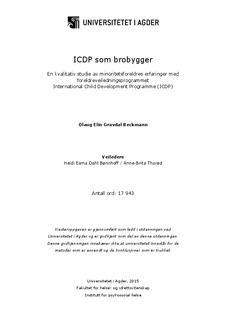ICDP som brobygger En kvalitativ studie av minoritetsforeldres erfaringer med foreldreveiledningsprogrammet International Child Development Programme (ICDP)
Master thesis
Permanent lenke
http://hdl.handle.net/11250/2381254Utgivelsesdato
2015Metadata
Vis full innførselSamlinger
Sammendrag
The background for the project:
The Ombudsman for children recommends conducting the parenting program International
Child Development Programme (ICDP) in connection with the introduction program for
municipalities that settle refugees. Previous studies have shown effects in the parenting
guiding program ICDP.
Aim and research question:
The purpose of this study adresses the minority parent´s experiences with the ICDP
programme. The research question is the following: ”Which experiences do minority parents
have with the parenting guiding programme ICDP and to which extent does the course have
importance for the relationship between the parents and their children?”
Method: Design, selection and analysis:
This study has a qualitative design and an interpretive phenomenological approach. There
have been conducted in-depth-interviews with five minority parets who all have completed
the program. The analysis is conducted according to Smiths Interpretive Phenomenological
Analysis (IPA).
Result:
The study shows that the parents experienced ICDP as a bridge builder between privious and
new experiences as well as initiating learning processes. It also served as a tool to meet their
children, families and the Norwegian society in a good way. It proved that factors like the
other group members, the supervisor and the practical implementation had a great impact on
their experiences from the program.
Conclusion:
The study confirms that the parent guiding program plays an important part in giving parents
tools to improve the relationship with their children. It also plays a role in guiding the parents
into the Norwegian society.
Key words:
International Child Development Programme (ICDP), Vygotsky, Schibbye, interpretive
Phenomenology, parents, children, group.
Beskrivelse
Masteroppgave psykisk helsearbeid- Universitetet i Agder, 2015
